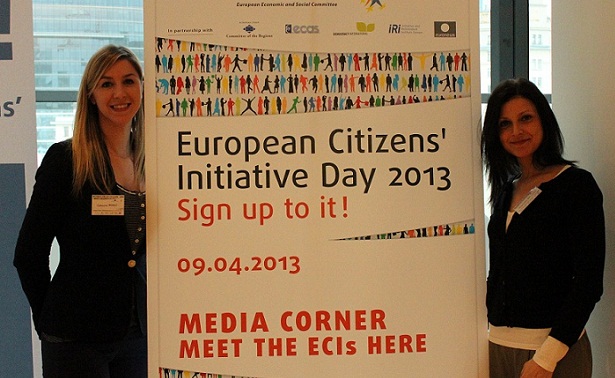Although The European Citizens’ Initiative (ECI), is a great bridge for citizens to make themselves heard at an EU level, neither lawmakers nor civil society organisations are happy with the instruments. This is mainly what was discussed and debated on the day. ECI must change itself to be an influential and useful instrument; it must adapt to the requirements and facilitate procedures. This issue became apparent as well as that European civil society organisations must provide logistical and advisory support and take responsibility. Also, there should be more campaigning for the revision of the EU legislation on the European Citizens’ Initiative, which is foreseen by April 2015. Under these circumstances, an independent contact point should be found. It should not be provided by the European Commission, though, which is the current situation following a last-minute move before the EU legislation of the ECI was adopted.
The main topic during the day was about how much and what kind of support the EU institutions should bring. Daniel Schily of Democracy International pointed out the difficulties the European Commission would have to face, if it had to provide advice to an ECI demand and to revise legislation initiated by the EU’s executive body. In this context he proposed that European civil society organisations should unite to commonly provide a helpdesk for the ECI in addition to an EU-financed contact point. Daniel Schily’s pledge was contrasted by other voices who requested the involvement of EU officials working on the ECI.

Up to date out of the 14 successfully registered ECIs, only the initiative of ‘Water is a human right’ has collected one million signatures. However, the initiative has not reached the criterion to gather a specific amount from at least seven countries in proportion to their population. In view of these high hurdles many ECI organisers admitted that they had launched an ECI merely for reasons of public relations and networking, while lacking belief that they could actually reach the amount of one million signatures.
In order to make the “ECI” a more effective instrument, Ronald Pabst of Democracy International stressed that an ECI would gain many more signatures if it was legally required as the first step towards a referendum. Gerald Häfner, Member of European Parliament and Chairperson of Democracy International, had the same opinion. “The right to a legally binding citizens’ initiative and the right to request a referendum on vital matters of EU importance are essential for a real democracy in the EU and in the Europe of the citizens.”
“Actions and a campaign towards a better ECI “Actions must now follow the words that were spoken on the Day. This will be the proof that European civil society is an independent strong player in the big world of the EU.


